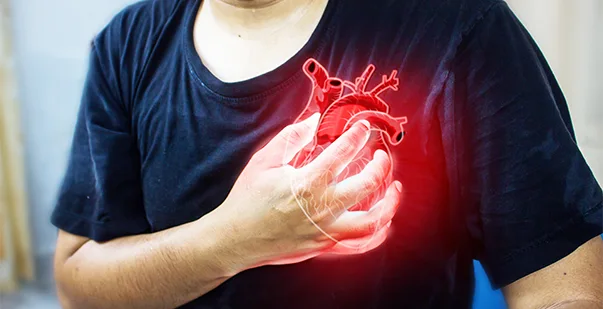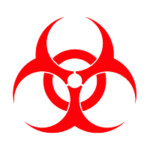Tachycardia is a condition where the heart beats faster than normal. While it’s common for your heart rate to increase during exercise, panic attacks or stress, tachycardia means your heart is racing even when you’re at rest. Understanding tachycardia is important because it can be a sign of underlying heart problems and can affect your overall health.
According to the reports, around 2.7 million people in the United States have atrial fibrillation, which is a type of tachycardia. This condition disrupts the heart’s normal rhythm and can lead to more serious health issues if not treated.
Let us understand what tachycardia is and what its symptoms are in the next sections.
Tachycardia Symptoms
Tachycardia can make you feel unwell in various ways. Recognizing the symptoms is important for seeking the right treatment. Here are some common tachycardia symptoms:
A rapid heartbeat makes your heart feel like it’s racing or pounding, even when you’re not active. Stress, anxiety, or intense activity can cause this feeling. While occasional rapid heartbeats may not be serious, frequent ones should be discussed with a healthcare professional.
Palpitations refer to the fluttering or irregular beating of your heart that can occur with tachycardia. You may notice your heart feeling like it’s skipping a beat or racing unexpectedly. This sensation can be alarming and may lead to anxiety. Palpitations can arise from various causes, including stress, caffeine, or certain medications.
- Dizziness or Lightheadedness
Dizziness or lightheadedness can occur when your heart beats too fast, reducing blood flow to your brain. This can make you feel unsteady and may lead to fainting. These symptoms can make it difficult to perform daily activities safely. Thus, recognizing such symptoms is important, as they can signal an issue with heart function.
Shortness of breath can happen with tachycardia, leading to difficulty breathing or feeling like you’re not getting enough air. This symptom can be distressing, especially during light activities like walking or climbing stairs.
Fatigue is another symptom of tachycardia, causing you to feel unusually tired or weak. Rapid heartbeats can cause your heart to work harder, leading to exhaustion, especially during normal activities. This fatigue can affect your energy levels, which makes it difficult to engage in daily tasks or exercise.
Understanding the tachycardia symptoms can help healthcare professionals in diagnosing and managing this condition.
Read More: 9 Basic Life-Saving Skills That Will Help You Save A Life
Causes of Tachycardia
Tachycardia, or unusually fast heart rate, can be caused by several factors. What causes tachycardia can vary, but it often includes factors such as heart disease, high blood pressure, and stress. Here are some common causes of tachycardia:
Certain heart-related issues can lead to a faster heart rate. One common cause is arrhythmias, which are irregular heartbeats that can make the heart beat too quickly or erratically. Conditions such as atrial fibrillation and ventricular tachycardia also fall into this category and can disrupt the normal rhythm of the heart, leading to an increased heart rate.
In addition, any existing heart condition can trigger tachycardia. For instance, individuals with coronary artery disease may experience faster heartbeats because their heart has to work harder to pump blood through narrowed arteries. Similarly, those with heart failure may find that their heart beats faster in an attempt to maintain adequate blood flow, especially during physical activity or stress.
- Non-Heart-Related Conditions
Tachycardia can also stem from various non-heart-related health issues. Fever is a common trigger as it occurs when the body is fighting an infection and the temperature rises. As a result, the demand for oxygen increases. This higher demand can cause the heart to beat faster to deliver the necessary oxygen throughout the body.
Anemia is another condition that can contribute to an increased heart rate. When there aren’t enough red blood cells to carry oxygen, the heart compensates by working harder and beating faster to ensure sufficient oxygen delivery to tissues.
Additionally, dehydration can also lead to tachycardia. When the body is dehydrated, blood volume decreases, prompting the heart to pump faster to maintain blood pressure and proper circulation. This can lead to noticeable symptoms of tachycardia, especially during physical exertion or hot weather.
Lifestyle choices can significantly impact heart rate, with certain habits leading to tachycardia. Excessive caffeine intake is a common culprit. Consuming too much coffee, energy drinks, or other caffeinated beverages can stimulate the heart and increase its rate, particularly in sensitive individuals.
Stress, whether emotional or physical, can also activate the body’s “fight or flight” response, causing the heart rate to rise. When the body perceives a threat, it releases adrenaline, which accelerates the heart rate in preparation for quick action. Certain drugs, especially stimulants and recreational drugs, can also contribute to tachycardia.
Tachycardia Diseases
Tachycardia can be linked to several specific heart diseases. When doctors explain what causes tachycardia, they are describing a condition that can affect how well your heart functions. Here are some common diseases associated with tachycardia:
- Atrial Fibrillation (AFib)
AFib is a condition in which the heart’s upper chambers (the atria) beat irregularly and often too rapidly. It appears with shortness of breath or dyspnea. Thus, it is important to manage AFib because it increases the risk of stroke and heart failure.
- Supraventricular Tachycardia (SVT)
SVT refers to a group of conditions where the heart’s upper chambers (atria) or the junction between the atria and ventricles beat too fast. This rapid heartbeat usually starts suddenly and can cause symptoms like palpitations, chest pain, and shortness of breath.
- Ventricular Tachycardia (VT)
VT is a condition where the heart’s lower chambers (ventricles) beat very fast. This can be a serious condition because it may reduce the heart’s ability to pump blood effectively. VT can lead to symptoms like dizziness, fainting, or even sudden cardiac arrest if not treated promptly.
- Wolff-Parkinson-White Syndrome (WPW)
WPW is a condition in which an extra electrical pathway is present in the heart. Although it can sometimes be asymptomatic, it can also lead to sudden episodes of rapid heart rate and symptoms like palpitations and dizziness.
Treatment and Management of Tachycardia
Managing tachycardia effectively involves a combination of treatments and lifestyle changes. Depending on the cause, different approaches may be used to help control your heart rate. Some of the main treatment options and their roles are as follows:
Managing tachycardia effectively often involves the use of medications. Beta-blockers are frequently prescribed to help slow down the heart rate by blocking the effects of adrenaline, which can contribute to a racing heart.
In addition to beta-blockers, antiarrhythmic medications are given to control abnormal heart rhythms. They work by stabilizing the electrical signals within the heart, maintaining a normal rhythm, and preventing episodes of tachycardia.
When medications are not effective, specific medical procedures can provide significant relief for individuals with tachycardia. Cardioversion is one such procedure that uses electric shocks to restore a normal heart rhythm. By delivering controlled shocks, cardioversion can effectively reset the heart’s electrical activity.
Another option is catheter ablation, a procedure that involves threading a thin catheter through the blood vessels to the heart. Once in place, the catheter uses energy—either radiofrequency or cryotherapy—to destroy small areas of heart tissue responsible for generating abnormal electrical signals.
Prevention and Lifestyle Tips
Managing tachycardia can feel overwhelming, but making a few lifestyle changes can make a big difference. To start, focus on your diet. Eating a balanced diet is a great way to support your heart.
Next, let’s talk about exercise. Aim for about 150 minutes of moderate physical activity each week, including walking, swimming, or cycling. Exercise can help strengthen your heart and boost your overall energy and mood, making it easier to tackle daily activities.
Additionally, be mindful of stimulants. If you enjoy coffee or energy drinks, try cutting back on caffeine, as it can elevate your heart rate.
Read More: 10 Ways To Improve Your Heart Health Quickly And Naturally
Managing Tachycardia for a Healthier Life!
Tachycardia, or a fast heartbeat, can affect your health and daily life. Knowing the signs and what makes your heart race can help you manage it better. Treatment usually includes medications, lifestyle changes, and sometimes medical procedures.
To prevent or manage tachycardia, focus on eating a healthy diet, exercising frequently, and reducing stress. Regular check-ups with your doctor are important to monitor your heart health. Furthermore, if you notice symptoms like a rapid heartbeat or dizziness, talk to your healthcare provider for the right care. You can go a step further and enroll in a first aid course to gain practical skills to learn how to recognize and respond to tachycardia.






